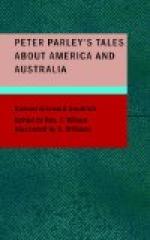The departure of Columbus on his second voyage presented a brilliant contrast to his gloomy embarkation at Palos.
There were three large ships of heavy burden and fourteen smaller vessels, and the persons on board, instead of being regarded by the populace as devoted men, were looked upon with envy as favoured mortals, destined to golden regions and delightful climes, where nothing but wealth, and wonder, and enjoyment awaited them.
At sunrise the whole fleet was under sail, on the 13th of October he lost sight of the Island of Ferro, and, favoured by the trade winds, was borne pleasantly along, till, on the 2nd of November, a lofty island was descried to the west, to which he gave the name of Dominica, from having discovered it on the Lord’s day.
As the ships moved gently onward, other islands arose to sight, one after another, covered with forests and enlivened by the flight of parrots and other tropical birds, while the whole air was sweetened by the fragrance of the breezes which passed over them.
In one of these islands, to which the Spaniards gave the name of Guadaloupe, they first met with the delicious fruit, the Anana or pine-apple.
Columbus now sailed in the direction of Hayti, to which he had given the name of Hispaniola, where he shortly arrived.
In passing along the coast he set on shore one of the young Indians who had been taken from that neighbourhood and had accompanied him to Spain. He dismissed him finely apparelled, and loaded with trinkets, thinking he would impress his countrymen with favourable feelings towards the Spaniards, but he never heard anything of him afterwards.
When he arrived on that part of the island where he had built the fort and taken leave of his companions, the evening growing dark, the land was hidden from their sight. Columbus watched for the dawn of day with the greatest anxiety; when at last the approach of the morning sun rendering the objects on shore visible, in the place where the fort had stood, nothing was to be seen. No human being was near, neither Indian nor European; he ordered a boat to be manned, and himself went, at the head of a party, to explore how things really were.
The crew hastened to the place where the fortress had been erected; they found it burnt and demolished, the palisades beaten down, and the ground strewed with broken chests and fragments of European garments.
The natives, at their approach, did not welcome them as they expected, like friends, but fled and concealed themselves as if afraid to be seen.
Columbus, at length, with some difficulty, by signs of peace and friendship, persuaded a few of them to come forth to him. From them he learned, that scarcely had he set sail for Spain, when all his counsels and commands faded from the minds of those who remained behind. Instead of cultivating the good-will of the natives, they endeavoured, by all kinds of wrongful means, to get possession of their golden ornaments and other articles of value, and seduce from them their wives and daughters, and had also quarrelled among themselves.




